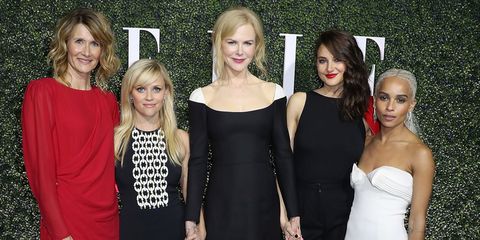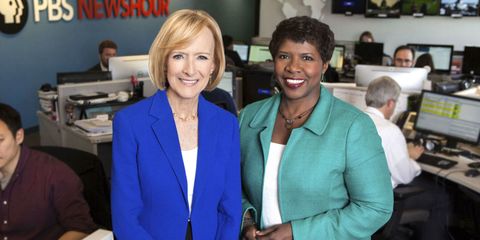"Quick! Hide the cocaine!" a commanding woman in heels and fashion sweatpants shouts as I walk into the Empire writers' room in Beverly Hills at 11 A.M. on a Tuesday. It's an open, well-lit space bordered by an inviting roof deck and a glass wall papered with big Technicolor Post-its: INT: RED LOBSTER; WORKING TITLE: MOMMA BEAR VS. SCORCHED EARTH.
It's surprising that they've even let me in: Most TV writers are too neurotic about the messy process (and too fearful of spoilers) to allow in outsiders. But the Empire writers' room has more swagger than most. The ratings for FOX's hip-hop family opera, spectacular from the start, crested with the first-season finale on March 18, 2015. With a stunning 17.6 million people tuning in to watch accusations of interfamilial attempted murder, Empire became the number one show in the coveted under-50 demographic. As has been much discussed over the past few years, the traditional television model is in a state of flux, with niche cable networks continuing to ramp up the high-quality competition and streaming sites like Netflix and Hulu stealing away eyeballs by the millions. But with Empire's success, the message was loud and clear: Broadcast TV is not dead!
Meanwhile, the show is momentous for African American audiences. Building upon the precedent set by Shonda Rhimes's Scandal and How to Get Away With Murder, which had put front and center Kerry Washington and Viola Davis—the first black women in nearly 40 years to lead prime-time network shows—Empire presented an entire family of African American leads, spanning generations, cultural tastes, and sexual interests.
The writers are "breaking" a mid-season-two episode—coming up with the overall story line—and the room swirls with the gleeful preposterousness that is Empire's raw life stuff.
"RICO, SEC, FBI…we're conflating the letters," says Ilene Chaiken, Empire's showrunner and executive producer.
"DNA, UTI," one cardiganed writer deadpans.
"I've been on my own since 13! Running around like a maniac, paying my own bills," interjects another writer, this one with a regally shaved head.
"And then Thirsty says, 'Get me a grave!' " says Chaiken, getting the group back on track.
"To hold on to power at any cost," a Sideshow Bob look-alike chimes in. "That makes it…"
"Shakespearean?"
"Greek! God. Oedipus. Such a fucking asshole."
Chaiken—who, in a dark-blue jumpsuit, looks like the world's classiest, tiniest mechanic—softly controls the flow. The only bump occurs when an assistant brings in a note from the studio. The suits would like to tone down an argumentative scene between Lucious and Marisa Tomei's take-no-prisoners businesswoman Mimi Whiteman. "They just want everyone to be bland," Chaiken shoots back. "But we're leaving it as is. 'Cause they're wrong."
Chaiken, who splits her time between the Chicago set and the L.A. writers' room, reveals zero reservations about pushing back. After a successful career as a television executive, Chaiken transitioned to being the talent herself. She made her name as a showrunner in 2004 by cocreating Showtime's The L Word, an L.A. power-lesbian, Sex and the City-like quasi-fantasia melodrama about a group of gorgeous, glamorous gay women, full of heart and sex, which earned a fervent following. Running for six seasons, plus launching a reality-show spin-off and a feature documentary, The L Word was the most intensive exploration of modern gay female life to date, and it has made her into a sort of den mother/icon/cult figure. Says Showtime president of programming Gary Levine: "Ilene is a goddess to the lesbian community."
The L Word touched the culture. But Empire has shaken it. Created by Lee Daniels—the Oscar-nominated director behind Precious and The Butler—and his collaborator Danny Strong, the show starts with a basic template: a hip-hop dynasty founded by the Puff Daddy–esque rapper-turned-mogul Lucious Lyon and his contentious ex-wife, Cookie, and their variously talented progeny Hakeem, Jamal, and Andre, who are locked in a death fight over its succession. From there, the show stirs together hip-hop, Internet, and Chicago culture with the aches, betrayals, joys, and intimacies of familial love. What ends up on the screen isn't always pretty, or even logical, but in its speed and boldness, it can be breathtaking.
So how does a 58-year-old self-described white Jewish lesbian from the suburbs end up running all that?
Since grade school in suburban Philadelphia, Ilene Chaiken wanted to be a writer. But at 13, a boyfriend—an "assertive, manipulative, obnoxious intellectual hipster artist teenage boy," Chaiken says, told her that "writing is obsolete." And she believed him, eventually going to college at the Rhode Island School of Design to major in graphic design and "working hard because I wanted desperately not to be obsolete." But junior year she switched to film because she realized she wanted to tell stories. One afternoon while editing her thesis movie—a fictionalized account of a real-life arts professor who'd notoriously slept with dozens of students, including her—Chaiken noticed one of her film teachers lurking over her shoulder. Seeing that her work skipped the artsy stuff in favor of narrative exposition, he told her: "Oh. You're going to go to Hollywood." It wasn't meant as a compliment.
Within a year of graduation, Chaiken did go, working at a low-level production job she'd gotten through some "sleazy guys" she'd met at a party. "I was ostensibly in the movie business. But I could have been making porn for all I knew," she says. It was during that period that she started dating women; shortly thereafter she met Miggi Hood, now her ex, the co-parent of their twin 20-year-old daughters.
By 1980, Chaiken had landed her first real job, as an assistant at the soon-to-be-legendary talent agency CAA. At the time, the firm didn't accept women into its agent training program. "They told us it was because we couldn't carry typewriters," Chaiken says. A few years in, the company finally had its first female agent trainee, but the climate for women was still toxic. One time, Chaiken recalls, an agent tossed her the keys to his red Ferrari and told her: Drive to this gas station, meet Mr. X, buy an eight ball of coke, and fill up the tank. She left the company.
After bouncing around the industry, she was hired at Quincy Jones Entertainment as an executive vice president overseeing development and production on shows like The Fresh Prince of Bel-Air. "I came to be a filmmaker," she says, "but I was doing pretty well [as an executive]. And once I start doing something, I'm always compelled to succeed." By 1989, though, she was made aware that she was a marked woman in the executive shuffle: "People are trying to get your job. There's egos and treachery. It got pretty evil." So she took a leap, holing up in a Telluride cabin for a few days to write a script—an homage to Kurosawa's Seven Samurai, about a "scrappy teenage girl in a rogue-warrior future." She called it Esme's Posse, got an agent, and sold it in weeks. By the time she got fired from Quincy Jones, she was a professional writer.
When the offer to interview to be Empire's showrunner came in, Chaiken was in talks with FOX for a development deal. The L Word had put her on the major networks' short list for showrunners, and Daniels and Strong were big L Word fans. But Chaiken wanted to do something of her own. So she said no. Then she said no again. And again.
Daniels and Strong would not be denied and finally persuaded her to screen the pilot. "It was all very top secret," Chaiken says. "They usher you into a little room and give you the remote and then more or less lock the door. It's usually a, um, grim experience. Ten minutes in, I was on board. I walked out [already] on the phone saying, 'I want this. Let's go for it.' "
Once they'd gotten Empire up and running, Daniels and Strong had always intended to get back to their film projects and cede day-to-day control. But the prospect was still "terrifying," Daniels says. Despite its operatic trappings, Empire is deeply personal to him, reflecting Daniels's own life story: How does a gay man deal with the overbearing homophobic father he still loves? How does an artist escape poverty and crime for wealth and fame but stay connected to a family still mired in that life? So Daniels fretted: "How do you bottle me up and make me happen?"
Chaiken got that. "Coming to run the show, it [wasn't] because it's my vision," she says. "I know how to extract from Lee what he means and who he is."
Fortunately, neither Chaiken nor Daniels are typical Hollywood machers. And neither is interested in getting the same old subject matter on TV. "That's why we connect so much," Daniels says. "We go into a room, we eye it up, and there's a quiet body language. I roll my eyes, she rolls her eyes. And then it's like, 'OK, what do we gotta do? Let's get this shit done.' "
Take the way the show has tackled the Black Lives Matter movement. In the season-two premiere, with her ex in prison on murder charges, Cookie throws a massive Free Lucious! concert in Central Park, railing against the nation's shameful national incarceration rates of black men. All while wearing a gorilla costume. In a cage. Despite the fact that Lucious is 100 percent guilty. Later, being arrested herself, Cookie offers an ode to the late Sandra Bland: "If I die in police custody, I did not commit suicide." Empire dives into contemporary politics with a grin. It is provocation, but a calculated, deeply considered sort that requires a whole lot of chutzpah. "You can take this any kind of way," Daniels says of Chaiken. "She pushes me. She winds me up. She goads me into jumping off the cliff."
The Empire writers' room consists of 12 writers: five black women, two white women, three black men, one Afro-Latino man, and—in a rare feat for this industry—only one white guy. When first staffing The L Word, Chaiken remembers the execs saying, " 'You don't have to hire lesbians! Any good writer can write lesbians!' I believed them, and I wanted to be a good girl. So I hired straight women and gay men." She quickly realized she couldn't do a show about lesbians without a writers' room dominated by them. "You can't pull back the curtain if you don't speak from that experience," she says. Empire, then, was always going to be a black show written primarily by black writers.
Back in the room, references fly: the '90s hood classic Above the Rim, the tween-besotted streaming service Periscope, theories about who killed Tupac. Chaiken knows what she doesn't know and asks questions. Still, going from creating a cable series in which her life mirrored that of the characters to producing a network spectacular about a world mostly foreign to her, she says she had to "project an aura of extreme confidence. But I go into every project filled with doubt, and fear, and loathing. So you drill down. You focus on the work."
For years, Chaiken has been approached—at airports, at her kids' summer camp, among high-level execs on a FOX management retreat—by lesbians saying something to the effect of, "Your show gave me the confidence to be who I am." Chaiken, who lives in L.A. with her wife, LouAnne, on the edge of Fryman Canyon, never tires of hearing it. "It still means a lot," she says. It also reinforces a certain responsibility. She feels she has to continue to push what were considered "nontraditional" cultures into pop culture, which, in addition to Empire, Chaiken will pursue with new projects under the seven-figure development deal she now has with FOX. (Additionally, a series is in the works based on a TV adaptation she wrote of Margaret Atwood's The Handmaid's Tale, in which women are nightmarishly subjugated.)
When Taraji P. Henson—Cookie herself—explains what Chaiken's all about, she gives a familiar sketch: of a warm, collaborative creative; of a quiet and steady force. But she tells of another side, too, one flashed when Cookie delivers the monologue about fighting back against the government at the Free Lucious! concert.
"I'm doing it. The crowd's going nuts," Henson recalls. "But I'm getting nervous! I'm thinking, What am I saying? This is prime-time network television! So I go to the video village where Ilene is, and I'm like, 'You really wanna do this? We're talking about dismantling the system piece by piece? We're going there?' "
Telling me what came next, Henson laughs big. Chaiken looked at her and calmly replied: "Yeah. We came here to fuck shit up."
This article originally appeared in the February 2016 issue of ELLE.

















